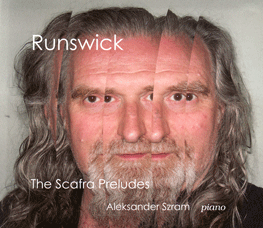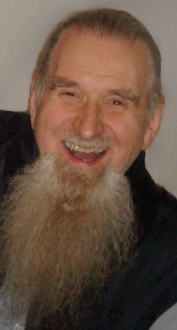

 |
 |
|
 Daryl Runswick's Scafra Daryl Runswick's Scafra
Dazzle Music DZ 6006 [64 mins] This is an exciting recording by Alexander Szram available as a CD in a limited edition, and also by download from iTunes. Daryl Runswick, "educated at Cambridge University and Ronnie Scott's Club", formerly Head of Composition at Trinity College, Greenwich, is a man of many parts (he has recently been touring his one-man jazz show). He has long been involved in developing and teaching methods of improvisation, which I experienced in a small way at a CoMA (Contemporary Music for All) summer school in Yorkshire. Scafra is a system Runswick devised and brought to full fruition in the twelve Scafra Preludes (preludial to what?) recorded in 2009 with pianist Alex Szram, who normally prefers to memorise and both perform and record without the It looks possible that this would work for the easier permutations in some of the Scafra Preludes: " - - a way of structuring a piece of music reminiscent of the 'process' techniques of the early
minimalists but used differently. The word itself is a contraction of Scan, Frame Advance, borrowed
from video technology - - The simplest example is a short series of notes,
say 1 to 6: repeat these notes (the frame) but miss off the first and add one to the end:
frame 1 - 1 2 3 4 5 6;
frame 2 -
2 3 4 5 6 7;
frame 3 - 3 4 5 6 7 8.
This is the basis of scafra: the frames advance. But there are many ramifications and refinements - - " [DR] The Preludes demand and receive here exemplary control from the pianist; some of them seem dry and sound formulaic (which they are). But in others emotion and pianistic excitement creep in, with some of the pieces "fiendishly difficult and pianistically awkward" [Graham Caskie in Piano professional (EPTA)]. Runswick has described the project (1995-2005) as his '48'; perhaps Bach's rigorously explored Art of Fugue might be a more apt analogy? Whatever, this is a work meriting careful study and a few of the pieces were welcome when Alex Szram introduced them to us in 2002 at a Trinity College of Music Graduates Reunion Concert. The score is available (relatively inexpensively) from Dazzle Music and I have reheard these recorded performances with it before me. But I have problems with the music itself; one can perceive the 'scafra' method readily in some, but by no means all of them. In No 8, for example, the cumulative added repeats from end back to front are easy to hear, but is the Reflective last line transformed by its sixth time of listening? Runswick mentions Ravel, who deliberately planned Gaspard to be the most difficult piece ever written, saying that the same was not his intention, especially as 'difficult pieces are harder to get played'... Some of the pieces are difficult indeed, and Szram earns congratulations for mastering them. Both Daryl Runswick & Aleks Szram have been valued contributors to Musical Pointers. Peter Grahame Woolf
|